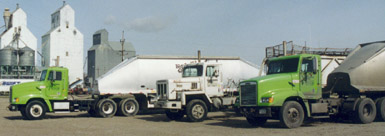|
On The Job with Holly Sugar By Lois Kerr
 The Sidney Holly Sugar plant discontinued shipping beets by rail from the receiving stations to the factory in 1969. Since then, the Sidney factory has relied on Transystems, a trucking company with main headquarters in Great Falls, to haul beets from the various receiving stations to the factory. Transystems began hauling beets for the Holly Sugar plant in Hardin, MT in 1968, and in 1969, when the trucking company began hauling beets for the Sidney plant, Transystems also became the official hauler for the Holly Sugar plant in Worland and Torrington, WY, as well. According to Mike Rice, Transystems spokesperson, hauling beets has changed dramatically in many ways since 1969. "Many things have changed, from truck size and efficiency to government rules and regulations," Rice remarks. In 1969, Transystems used eight axle, 105,500-pound trucks to haul beets. With improvements in equipment and changes in laws, the company moved to 117,000-pound trucks, then increased size again to the 123,000 trucks used to haul beets today. "This is just on the Montana side," Rice points out. "On the North Dakota side, we started out with 80,000-pound trucks, and then in a very few North Dakota points we were able to increase to 105,500-pound trucks." The Sidney plant used to have several North Dakota receiving stations, as well as many more sugar beet stations scattered throughout the valley in Montana. As beet receiving station locations changed, so did distances from those stations to the factory. "Sites have changed a lot over 30 years," Rice says. "Holly Sugar has consolidated stations, and we now have sites that were not in existence 30 years ago." He adds, "Beet receiving stations have changed a lot over the years, and the distances we travel to haul those beets has increased dramatically." Changes in equipment and changes in receiving stations are not the only differences. Acres have increased, tonnage has increased and as a result, Transystems drivers now work nearly all winter to haul beets to the factory for processing. "We used to finish hauling a lot earlier in the season," Rice remarks. "We used to haul from October till the end of December or early January. Now we haul well into March." "It depends on the year," he continues. "It depends on size of crop, and tonnage per acre. Growers are getting smarter and seem to produce better and larger crops." Rice feels one of the biggest improvements the trucking company has noticed over the years concerns improved roads. "Despite what people think about our highways, our roads today are a lot easier to drive on," Rice comments. "The elevated roads keep the snow and ice off a lot better than did the roads 30 years ago. These elevated roads provide for better visibility and easier handling of adverse weather conditions." Transystems has the responsibility of providing beets to the factory throughout the winter. The factory runs on a 24-hour day, 7 days a week schedule, and so does Transystems, a necessity to keep the factory supplied with beets. The number of trucks on the road at any one time depends on whether the drivers are making long hauls, such as delivering beets from the Culbertson or Pleasant View beet stations, or whether drivers are delivering beets from short hauls, such as Savage and Fairview. "The only time we stop the trucks is for a safety issue," Rice says. "A safety issue generally involves weather, either visibility or ice. We will shut down for weather. We can only do what the weather permits." Transystems supervisors watch driver hours carefully, so no driver suffers from driver fatigue. Drivers work a shift every day for four days, then have two days off. Transystems also does all the outside loading of beets at the various receiving stations. Loader operators use a large loader with a five-ton bucket capacity for loading beets into the waiting trucks. Loader operators also work shifts that keep the loader in operation for 24 hours every day. Rice likes to see a large pile of beets at the factory yard. "If there isn't a large yard pile, it puts the factory at risk," Rice explains. "The function of the yard pile is to act as a back-up for bad weather conditions." Rice also likes to see a large factory yard pile because a large yard pile lowers the overall freight rates for Holly Sugar. "High freight rates, whatever the cause, inflicts pain on Holly Sugar. That isn't good," Rice states. "We don't like to see that." Rice feels that Holly Sugar has been an exemplary company with which to do business. "In my estimation, the changes we've seen in the trucks, with their size, weight and efficiency, are not nearly as significant as the lack of change in certain areas. Areas like the demeanor and good business ethics of Holly Sugar," Rice declares. "Holly Sugar has a get-the-job- done attitude, and has always given us full cooperation." He continues, "Each year is different. Lots of different and unexpected things come up. Holly Sugar has always cooperated with us and has been an excellent company to work for. They maintain good, old fashioned business ethics, and I can't express sufficiently what a pleasure it is to work with Holly Sugar." Rice can't say the same for government with its rules and regulations. "The biggest negative change has been with government," Rice says. "Government is a thousand tornadoes; ill informed and with hundreds of volumes of laws." Transystems also hauls the necessary coal required to operate the Sidney Holly Sugar plant. "We've been hauling coal for Holly Sugar ever since the plant made the partial changeover to a coal fired operation," Rice says. "This works well, because we also supply coal to the MDU plant in Sidney." Transystems not only hauls beets for the Rocky Mountain Holly Sugar plants, but also hauls beets for American Crystal in the Red River Valley. |